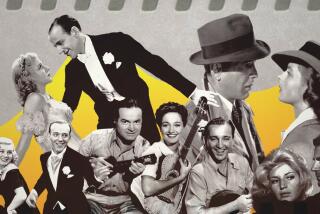Some welcome the C-rated film
- Share via
I’M thrilled someone is filtering movies and can’t wait for CleanFlicks to open nearby (“Are these videos rated C for clean or compromised?,” by Bob Baker, Oct. 14).
Why hasn’t Hollywood discovered the money to be made with clean versions? They routinely cut their movies for studio decisions and TV ads and then offer director’s cuts, commentary, wide or full screen and deleted scenes on the DVDs. TV networks routinely omit objectionable scenes and silence offensive words. Foreign versions are not only dubbed but also modified to fit “cultural sensitivities.”
Why shouldn’t the average citizen have the same opportunity?
Bill Spencer
Dana Point
*
I don’t find nudity, violence and the constant use of profanity or the F-word entertaining, nor do most of the people I know. I think CleanFlicks is a wonderful idea, and if there were a CleanFlicks store in my neighborhood, I would be one of its customers.
Since there seems to be a large number of people who feel the same, maybe Hollywood filmmakers should -- dare I say that horrible word? -- censor themselves and clean up their movies so the public wouldn’t have to do it for them.
Mandy Baker
Whittier
*
OFFERING consumers alternatives neither diminishes the esteem of a given work nor thwarts accessibility to that work for those who seek an unedited, original version. Hollywood directors and studios -- the latter as profit-motivated as they come -- would be wise to offer differing cuts to consumers.
In fact, such is already done to an extent if one considers the special director’s cuts and unrated versions of many hit films available on video and DVD. No one seems to be protesting that. And let’s not forget that most films result from a Hollywood entity buying, then altering, a script, an artwork in its own right. Those directors protesting CleanFlicks are opposing an inherent principle of their own craft.
Nathan Scoll
Los Angeles
*
IN case they’ve missed them, here’s a list of some recent popular and classic films that CleanFlicks may want to consider for their “family” versions: “Last Tango in Paris” without the sex; “The Exorcist” without any of the disturbing, offensive scenes with the little girl; “Raging Bull” without the ring violence; “Jaws” without the scary shark; “The Godfather” without the mob violence; and “Schindler’s List” without the scenes of women and men being murdered that might disturb some viewers.
CleanFlicks, in “sanitizing” the films’ methods of storytelling to suit anyone’s self-serving needs, not only infringes on copyrights, it may do even more long-term damage to an arguably artistic medium, that of homogenizing the vision so as to completely rob the authors of their collective voice and the film of its very essence and meaning. Depictions of sex and violence and the use of “off-color” speech, as offending as they may be, are a means to tell stories that, like “Saving Private Ryan,” rely on these depictions to provoke the emotions, the thoughts and the reactions that are so unique to the story and to film as a medium.
CleanFlicks establishes a precedent more disturbing than any sexual or violent depiction captured on film. It opens the door for other similar organizations devoted to shielding viewers from “filth” while at the same time promoting censorship and, yes, fascism. One can easily imagine CleanSculpture or CleanPaintings or even CleanNews, where the world has been sanitized for easy consumption, where nothing disturbing or thought-provoking is ever shown in the living room.
Mark Fleischer
Santa Ana
*
THE media furor over edited videos and the recent Directors Guild of America lawsuit has unfairly lumped in DVD-filtering providers such as ClearPlay with the video chain CleanFlicks, when in actuality these companies are as different as night and day.
The latter physically edits copies of Hollywood films and then rents these “cleaned up” versions. On the other hand, ClearPlay provides families with an enhanced parental control that acts like a remote control to skip over or mute R-rated material, without permanently altering the content of the DVD in any way. You return the same DVD you rented -- or you can watch it later without ClearPlay parental controls once the kids have gone to bed.
The whole debate really boils down to parents’ rights.
Why does Hollywood think it has the power to control whether parents may filter out graphic violence and nudity in the privacy of their homes? If Hollywood directors wish to control how their movies are viewed, then they should limit their distribution to the movie theater, a place they can control. They clearly do not and should not have such control in the family room.
Bill Aho
Chief executive, ClearPlay Inc.
Salt Lake City
More to Read
The biggest entertainment stories
Get our big stories about Hollywood, film, television, music, arts, culture and more right in your inbox as soon as they publish.
You may occasionally receive promotional content from the Los Angeles Times.










